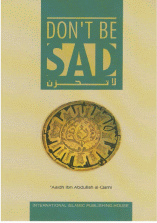Don't be Sad

Ten gems for a good and noble life
- Wake up in the last third of the night to beg forgiveness from Allah.
(And those who pray and beg Allah s Pardon in the last hours of the night.)
(Quran 3: 17)
- At least once in a while, seclude yourself from people in order to contemplate.
(And [those who] think deeply about the creation of the heavens and the earth…) (Quran 3: 191)
- Stay in the company of the righteous.
(And keep yourself patiently with those who call on their Lord…)
(Quran 18: 28)
- Remember Allah often.
(Remember Allah with much remembrance.) (Quran 33: 41)
- Pray two units of prayer with sincerity and devotion.
(Those who offer their prayer with all solemnity and full submissiveness) (Quran 23: 2)
- Recife the Qur'an with understanding and reflection.
(Do they not then consider the Quran carefully?) (Quran 4: 82)
- Fast on a hot, dry day.
"He abandons his food, drink, and desire ---- all for me."
- Give charity secretly.
"Until the left hand doesn't know what the right hand has spent."
- Provide relief and aid to the afflicted Muslim.
"Whoever gives relief to a Muslim from one of the vicissitudes of this life, Allah will relieve him from a calamity that is from the calamities of the Day of Judgment"
- Be as abstemious and abstinent as possible in this fleeting world.
(The Hereafter is better and more lasting.) (Quran 87: I 7)
Among the delusions of Prophet Noah's son was his saying:
('I will betake myself to a mountain, it will save me from the water) (Quran 11: 43)
Had he betaken himself to Allah, his outcome would have been very different. The cause of misery for An-Namrood (Nebuchadnezzar) was his saying, "l bring about life and I cause death." He tried wearing a garb that wasn't his and he claimed to have a quality that he didn't in fact have — and thus his downfall became complete.
The key to our happiness can be summed up in one simple yet
profound phrase, the Phrase of Tawheed (Islamic Monotheism):
"There is none worthy of worship except Allah and Muhammad is His Messenger"
When one pronounces this phrase on earth, it will be said to him in the heavens, "You have spoken the truth."
(And he [Muhammad] who has brought the truth [this Qur'an and Islamic Monotheism] and [those who] believed therein.)
(Qur'an 39: 33)
And when one lives his life in harmony with this phrase on a practical level, he will be saved from destruction, shame, and the Hellfire.
(And Allah will deliver those who are the Muttaqoon [pious] to their places of success [Paradise].)
(Qur'an 39: 61)
When one not only applies the Phrase of Tawheed, but also calls others to it, his name will be remembered and he will be made victorious:
(And that Our hosts, they verily would be the victors) (Qur'an 37: 173)
When one loves the Phrase of Tawheed, he will be elevated in ranking and endowed with honor.
(But honor; power and glory belong to Allah, His Messenger [Muhammad], and to the believers...)
(Qur'an 63: 8)
Bilal (may Allah be pleased with him) called out with the Phrase of Tawheed and his situation underwent a dramatic inward change that ran parallel to his outward change of being freed from slavery.
(He brings them out from darkness into light.) (Qur'an 2: 257)
Abu Lahab balked at and desisted from saying the Phrase of Tawheed. He died in a weak and pathetic state.
(And whosoever Allah disgraces, none can honor him.) (Qur'an 22: 18)
The Phrase of Tawheed is an elixir that transforms the base human being into a paragon of pureness and devotion.
(But we have made it [this Qur'an] a light wherewith we guide whosoever of our slaves we will.) (Quran 42: 52)
Whatever you do, do not exult in wealth acquired if you have turned your back on the Hereafter. If you do turn your back on the Hereafter, a harsh punishment and severe chastisement will lie in wait for you:
('My wealth has not availed me. My power and arguments (to defend myself) have gone] have gone from me!) (Qur'an 69: 28-29)
(Verily your Lord is Ever Watchful [over them].) (Quran 89: 14)
Also, do not exult excessively in your child if you have forgotten your Lord. Turning away from Him is the ultimate failure.
(And they were covered with humiliation and misery…) (Qur'an 2: 61)
And finally, do not be complacent about your wealth if your deeds are evil, for such deeds will be your disgrace in the Hereafter.
(But surely the torment of the Hereafter will be more disgracing.)
(Qur'an 41: 16)
(And it is not your wealth, nor your children that bring you nearer to Us [i.e. pleases Allah], but only he [will please Us] who believes [in the Islamic Monotheism], and does righteous deeds…)
(Quran 34: 37)
